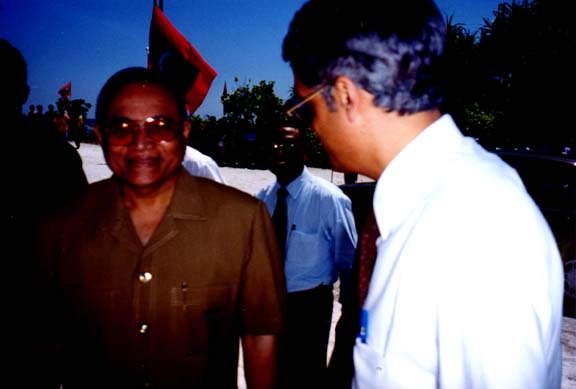His Excellency Mr. Maumoon Abdul Gayoom
President of the Republic of Maldives
on the Occasion of the Inauguration of
the Kaashidhoo Climate Observatory
Kaashidhoo
23 February 1998



Honourable Ministers, Professor Ramanathan, Mr. Hung Nguyen, Officers of the Centre for Clouds, Chemistry and Climate, Ladies and Gentlemen:
Let me begin by extending a very warm welcome to all of you who are involved in the work of the Kaashidhoo Climate Observatory and its parent research project, the Indian Ocean Experiment. I wish you a most comfortable and fruitful stay in the Maldives. The work that you do here will be of major importance not only to the Maldives but to many other countries as well. I understand that many environmental scientists, the United Kingdom, France, Germany, India and the Netherlands are committed to the INDOEX.
It gives me great pleasure to be here with you this morning to inagurate the KCO, which is the sixth meteorological observatory to be set up in the Maldives. Given our vast open spaces, the necessity of frequent travel, and the biological and economic importance of our clean environment, setting up such an advanced facility is an important step in upgrading our meteorological services.
I am happy to note here the pivotal role played by the Deputy Director of the Centre for Clouds, Chemistry and Climate, Mr. Hung Nguyen, in establishing the KCO. I would also like to express my appreciation of the significant contribution of the National Science Foundation of the United States through the C4, and also of the leadership provided by the co-chief scientists, Professor Ramanathan and Professor Crutzen. The local counterpart services that are being rendered by the Minister of Planning, Human Resources and Environment, Mr. Abdul Rasheed Hussain, the Deputy Minister, Mr. Abdullahi Majeed, and their able staff deserve our sincere praise.
Honourable Ministers, Ladies and Gentlemen:
It is indeed symbolic and fitting that the C4 has selected the Maldives to be one of their research stations in the INDOEX. From the earliest days of our history, Maldivians have been known to keep a watchful eye on the elements. It is, of course, understandable. For our environment is fragile. Our islands are small, and they are widely scattered. These geographical realities compel us to be eternally vigilant about changes in the weather. As keen sailors and fishermen, our forefathers had developed certain ways of reading the weather based on the observation of cloud formations, wind direction, tidal patterns and the intensity and frequency of breakers. How well one made use of them made all the difference between plain and turbulent sailing, or between getting a good catch and risking life and limb.
Our concern with the elements has also taken a totally new dimension in recent years: that of climate change due to global warming. It may seem a less imminent danger than threatening storm clouds overhead. But, it is a more ominous one. Few states stand to lose as much as the Maldives from the adverse effects of global warming and subsequent sea level rise.
Years after the Inter-governmental Panel on Climate Change had concluded that there was a discernable human influence on the global climate, there still remain several unsolved mysteries. These require further exploration, examination and understanding. Our responses to climate change need to be guided by the light of genuine knowledge. The alternative is shooting in the dark, hitting some targets but missing many.
I believe that the field studies to be carried out under the INDOEX will address a major information gap in our understanding of global warming. The role that the oceans and the air above them play in the processes is no doubt of direct relevance to the Maldives and to all other coastal regions. Moreover, the data collected by the field studies conducted under this programme will provide the raw material to further refine the scientific models used to anticipate climate change.
Sound predictions are of vital importance in motivating nations and other stakeholders such as businesses to take timely measures. Very often lingering doubts are used as an excuse for inaction. Therefore, we must pursue rigorous and open-minded research. Accurate forecasts based on state-of-the-art knowledge will leave no moral basis for inaction. For an ecologically vulnerable country like the Maldives, effective action is a matter of great urgency.
Should sea levels rise by about one metre, as a result of predicted increases in global temperatures, nearly 80 percent of the Maldives will be inundated. The remaining 20 percent might also be reduced to mere sandbars. In any case, they would not be able to sustain human habitation as a result of other factors that will accompany such sea level rise. This is, indeed, an alarming scenario. But, it is more terrifying in the absence of a deeper knowledge about the various aspects of what is in fact a very complex phenomenon. We simply cannot turn a blind eye to any of the processes involved in climate change. There is too much at stake.
Honourable Minsters, Ladies and Gentlemen:
The Maldives has spared no effort in alerting the international community to the grave dangers posed to us, and indeed to many other countries, from climate change. We have urged influential nations to take effective remedial action to address global warming. We have acceded to international conventions that seek to protect the environment. At home, too, we have pursued policies that will contribute to safeguarding our national habitat. All of these actions are of immense importance to the people of the Maldives. The INDOEX will hopefully make a significant contribution to understanding climate change, and we are happy to participate in this important international project.
I wish the INDOEX and the KCO every success.
Thank you!